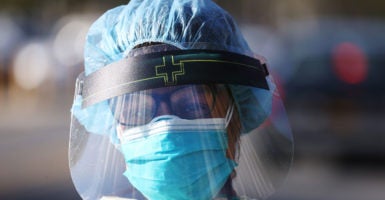In the “whole of country” approach the United States has taken to addressing the COVID-19 pandemic, companies large and small—and from a variety of industries—have joined the fight by developing diagnostic tests, altering production to make medical equipment and necessary supplies, and donating resources to those who need them.
>>> When can America reopen? The National Coronavirus Recovery Commission, a project of The Heritage Foundation, is gathering America’s top thinkers together to figure that out. Learn more here.
Here are four ways the private sector is helping with the fight against the new coronavirus, which causes COVID-19:
1. Diagnostic Tests
We need extensive testing to get people back to work and resume normal activities, and the Food and Drug Administration has used emergency powers to make COVID-19 diagnostic tests more rapidly and widely available.
The FDA has issued more than 34 permits, and tests have become faster and more accurate. Abbott Laboratories’ portable test delivers results in minutes, and others, such as Robert Bosch GmbH and Qiagen, have developed tests with improved processing times.
2. Ventilators and Respirators
With ventilators and respirators in high demand early on, companies that make ventilators stepped up. Medtronic, for example, not only increased its production, it also published online the design specs and papers on how to make its patented ventilator, which permitted other companies to make their product.
Companies that neither sold nor manufactured medical equipment adapted their production lines to make ventilators and respirators. General Motors, 3M, and Dyson, the vacuum cleaner maker, are just a few of the high-profile companies that rapidly produced this equipment for hospitals.
3. Medical Supplies
With basic medical supplies, such as face masks and hand sanitizer, in high demand, businesses of all sizes and industries have helped.
Hewlett Packard uses 3D printers to make face masks and face shields. MyPillow voluntarily shifted 75% of its production capacity to making cotton face masks to donate to hospitals.
N95 surgical masks are being produced by Honeywell at its plant in Rhode Island, and Superior Bindery Inc., a small business in Massachusetts, is turning recycled cardboard into basic masks for the general public.
Well-known American companies such as alcoholic beverage maker Pernod Ricard, as well as small, local distilleries, are making hand sanitizer.
“In times like this, it is important that everyone, especially companies with strong U.S. roots, like ours, prioritize good corporate citizenship and step up in the name of the greater good,” said Ann Mukherjee, the CEO of Pernod Ricard North America. “I am glad that we were able to form this public/private partnership and repurpose our spirits production facilities to meet a pressing, national need.”
4. Charitable Giving
Anheuser-Busch, the largest sponsor of live sports and entertainment in the U.S., redirected resources to its nonprofit partners, such as the Red Cross, and donated media airtime for public service announcements.
Morgan Stanley announced a $50 million global pandemic relief donation. The Arizona Diamondbacks Foundation donated more than $500,000 to organizations that support food supply and child care.
These are just a few of the many examples of the private sector stepping up to help the nation get through this crisis.
Religious organizations also have innovated in how they provide support to those in need.
Many churches have moved to virtual services to provide support to communities. Birmingham Church of the Highlands, Alabama’s largest church, has operated a medical clinic for more than 10 years and is now the site of a drive-thru COVID-19 test center.
Government has played a critical role in managing the COVID-19 crisis, but so have private sector companies and organizations—and the men and women who work for them.
































One Reply to “4 Ways the Private Sector Is Combating COVID-19”